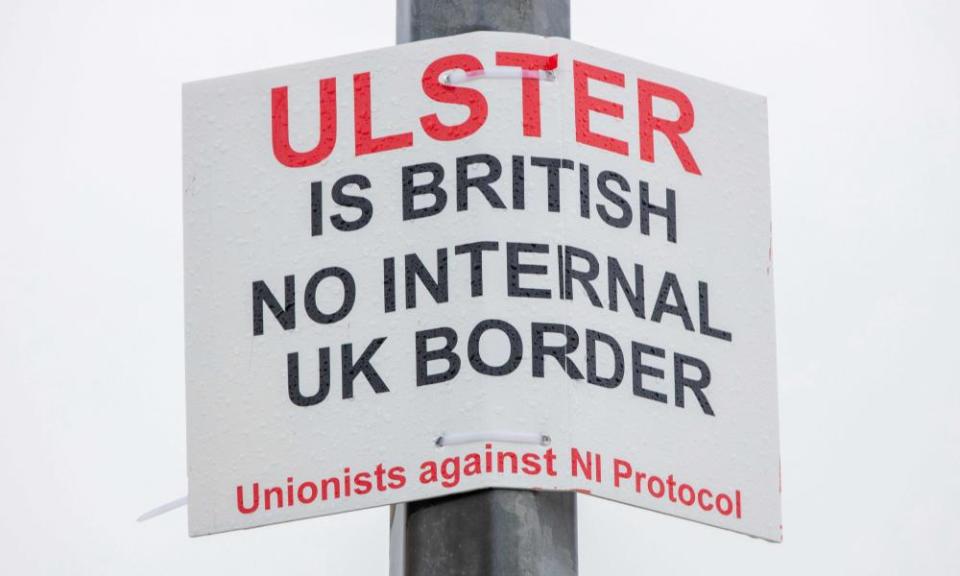Irish Sea border protest posters reflect loyalist anxiety in Northern Ireland
The anonymous and vaguely menacing posters have proliferated across Northern Ireland since the start of post-Brexit checks on food- and plant-related goods travelling from Britain.
“Loyalist Markethill will never accept a border in the Irish Sea,” says one, the “never” in red capital letters. “Loyalist Rathcoole will never accept a border in the Irish Sea,” says another.
There are hundreds like them bedecking lamp-posts, all neatly printed, all leaving the potential consequences of the border unstated. It is hardly an uprising but the posters reflect loyalist anxiety about Northern Ireland’s position in the UK – and the snaring of the Democratic Unionist party (DUP) in a political trap of its own making.
The party of Arlene Foster, Ian Paisley and Sammy Wilson backed Brexit as a liberating new dawn but now finds itself demoralised and disoriented by the Northern Ireland protocol, the part of the Brexit deal that keeps the region aligned with EU rules while the rest of the UK goes its own way.
Some unionists fear the disruption in food supplies since it came into effect in January is the start of a process that will tilt Northern Ireland away from Britain and towards Ireland, a fate they have resisted since Northern Ireland’s foundation a century ago. Others consider such concerns overblown and think the protocol is purely about trade and could be made to work with political will.

“This is not a mass mobilisation of the pro-union community against the protocol. Most are thinking: ‘Can this be fixed?’ Those in business are thinking: ‘How may this benefit the economy?’” said Peter Shirlow, a director at the University of Liverpool’s Institute of Irish Studies and an authority on unionism.
In this moment of crisis, the DUP is hamstrung. It appears unwilling to make the new arrangements work or to lead a full-throated charge to overturn them. Its fingerprints are on the protocol. The party backed leave in the 2016 referendum, sank Theresa May, and put its trust in Boris Johnson, only for the prime minister to betray his allies in Northern Ireland and agree to a de facto border in the Irish Sea.
In January, Foster, the party’s leader and Northern Ireland’s first minister, seemed reconciled to the new reality. She played down the political implications and mooted the benefits of privileged access to EU markets.
Alarm among core DUP voters, and the EU’s blunder in briefly moving to trigger article 16, prompted a U-turn. Foster launched a campaign to scrap the arrangements and said the DUP would boycott all engagements with the Irish government on matters relating to the protocol. It will press its case in a House of Commons debate on Monday.
Related: Brexit negotiator David Frost to have cabinet role as EU pact enforcer
But Downing Street and the European commission have shrugged off the campaign and reiterated their commitment to the protocol, leaving the DUP with three unpalatable options. It could escalate its opposition to all-out defiance, with potential for paramilitaries and other shadowy elements joining the campaign to try to force London and Brussels to renegotiate the protocol.
This would please hardline loyalists, but it risks backfiring. The power-sharing executive and assembly at Stormont would probably collapse, leading to elections that could result in the Alliance party siphoning more votes from the DUP and crown Sinn Féin as the biggest party, installing Michelle O’Neill as first minister, a prospect that makes unionists blanch.
“Is the scrapping of the protocol more important than the continued operation of the assembly? A choice may have to be made,” Peter Robinson, a former DUP leader and party grandee, said last week in a Belfast News Letter article.
The second option is to embrace the protocol – play down any constitutional implications and focus on economic benefits, as Foster briefly did before. The risk is that supporters will defect to Traditional Unionist Voice, a flintier rival that has tapped unionist anxiety and is surging in polls.
The third option is to muddle along lamenting the protocol but without destabilising Stormont.
Jeffrey Donaldson, the party’s leader at Westminster, appeared to keep options open in an interview with the Guardian. The protocol was hurting businesses, consumers and citizens’ rights and needed to be addressed urgently, he said. “We want to see political stability. I won’t be drawn on what steps we might take if these issues are not taken seriously. We’re not ruling any steps out at this stage. We’re clear whatever we do must be lawful.”
A party insider predicted the DUP would opt for the muddle. “They don’t have good options. Bumble through is probably as close as you will get.”
If so Northern Ireland is on course for a perilous, toxic stalemate, with unresolved anger over the protocol poisoning the political climate in its centenary year. “Brexit has come to dominate unionism,” said Shirlow. “They didn’t understand the repercussions of being Brexiteers.”

 Yahoo News
Yahoo News 
